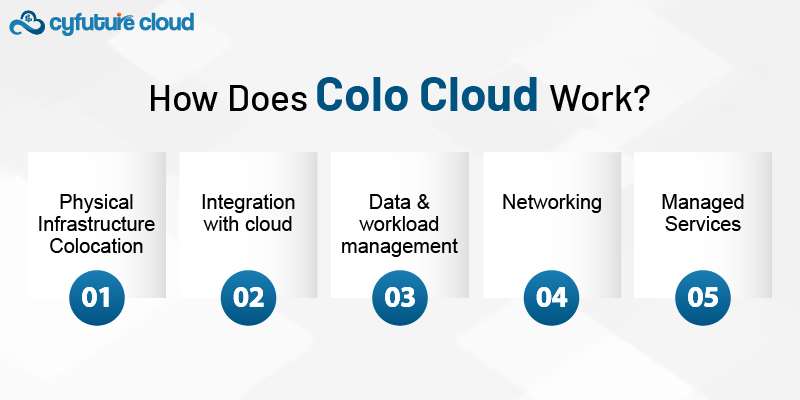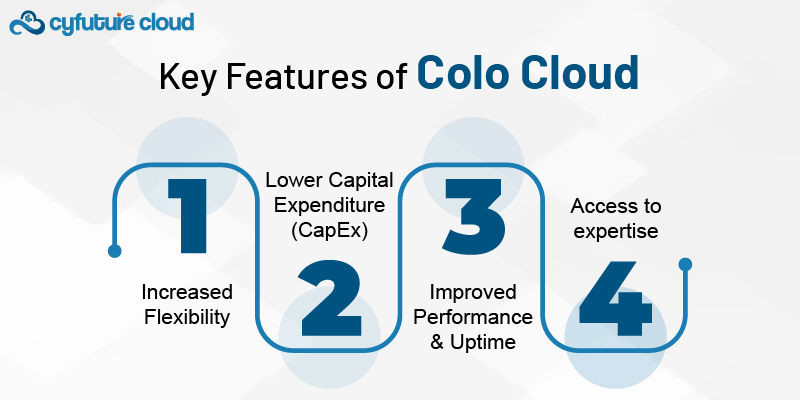 Server
Colocation
Server
Colocation
 CDN
Network
CDN
Network
 Linux Cloud
Hosting
Linux Cloud
Hosting
 VMware Public
Cloud
VMware Public
Cloud
 Multi-Cloud
Hosting
Multi-Cloud
Hosting
 Cloud
Server Hosting
Cloud
Server Hosting
 Kubernetes
Kubernetes
 API Gateway
API Gateway


Cloud computing has revolutionized the IT infrastructure world for any enterprise. Cloud computing offers flexibility, scalability, and cost efficiency for businesses. One of the most prominent services offered under the cloud is called Colocation Cloud, typically known as Colo Cloud. It is a fusion of the concepts behind colocation and cloud computing. This hybrid model will let businesses enjoy the fruits of having a third-party-colocated physical infrastructure on one end, while reaping all the advantages that come with cloud services, by which computing resources are offered at demand.
In this article, we are going to discuss what Colo Cloud is, its features, how it works, and benefits that it gives.
Colo Cloud is a hybrid IT infrastructure solution that would colocate the physical hardware of a business, including servers and networking equipment, in a third-party data center while combining the comfort of cloud computing flexibility. That is, businesses are still in charge of their physical infrastructure but outsource to a colocation provider the burden of managing, maintaining, and scaling it. On the other hand, however, they can tap into cloud-based virtualized resources in case their demand spikes or they intend to expand their operation.
This model captures the best of both worlds: Colocation assures secure and reliable housing for the hardware, while elastic and scalable resources are presented in the paradigm of cloud computing that can be accessed as needed. This hybrid approach, in particular, is very beneficial for organizations that want to maintain control over their hardware but do need the flexibility to scale very quickly.

Colo Cloud works by integrating a business's on-premise infrastructure, which is essentially colocated hardware, with cloud services. The basic steps that would help one understand how this system works are as follows:
Physical Infrastructure Colocation: Businesses buy and own their hardware, such as servers, storage devices, and network equipment, and house these components inside a colocation facility. The provider of the colocation facility supplies the power, cooling, physical security, and internet connectivity.
Integration with cloud: Once all the physical infrastructure is set up, cloud services are then integrated into the setup. This way, there is no cause for alarm; business entities can integrate their on-premise hardware without necessarily causing any issues by connecting it to the cloud. It could be a private cloud, a public cloud, or even a hybrid cloud solution.
Data and workload management: The business controls their physical infrastructure but can use cloud services for managing fluctuating loads in terms of scalability and flexibility. They could manage workloads on-premise, offload peak workload to the cloud, or use cloud resources for specific activities such as backup, disaster recovery, or data analytics.
Networking: Most colocation data centers offer high-speed networking, allowing colocated hardware to be connected to the cloud environment. In general, this network connectivity is virtually a necessity for business organizations to avail themselves of the services of the cloud and to distribute workloads efficiently.
Managed Services: Colo Cloud services usually have additional managed services provided by the facility itself. Such services commonly include monitoring, hardware maintenance, and uptime, thereby enabling businesses to free themselves from the management burdens of their IT infrastructures.

Hybrid Infrastructure: Colo Cloud is a hybrid approach that involves the use of physical infrastructure together with the use of cloud resources. Business will therefore be able to own their hardware but still benefit from using cloud computing.
Scalability: The main advantage of using Colo Cloud lies in scalability of computing resources, based on rising demand, businesses can easily scale and thereby get cloud services without purchasing any new hardware.
Redundancy and Reliability: Typically, colocation facilities possess many redundant systems, such as the backup for power and cooling system and network connectivity, so the physical hardware of the businesses should always work. Along with cloud services, this indeed creates a reliable infrastructure.
Cost Efficiency: The business can benefit through cost savings; it will save on having to build and maintain data centers since all its infrastructure can be colocated in a third-party data center. Cloud services also present additional benefits on cost benefits of pay-as-you-go models.
Customization and Control: Since the cloud infrastructure of Colo Cloud is not completely virtualized, it is just like any public cloud service. They allow businesses to have more control over their hardware. This level of customization seems apt for organizations that have specific IT requirements or legacy systems.
Increased flexibility: Colo Cloud will empower the businesses with a power of choice for how, in what proportion cloud should be used. Businesses can operate their infrastructure to best suit their IT management needs through customization of using cloud resources and services. It is very suited for those businesses whose demand is fluctuating or has a complex IT environment.
Lower Capital Expenditure (CapEx): A colocation facility does not incur the huge one-time expenses of building and establishing the data centers for organizations. Meanwhile, they will be able to scale up operations by availing cloud services without acquiring additional hardware resources.
Improved Performance and Uptime: Dedicated colocation data centers are designed for high availability, incorporating multiple layers of redundancy and monitoring 24/7. The integration of cloud services simply guarantees that the business's IT infrastructure will remain functional and responsive, even at high usage.
Access to expertise: Managed services will include monitoring, troubleshooting, and maintenance by colocation providers on the physical infrastructure. In that way, businesses would focus on core activities while having experts in charge of infrastructure management.
It is a time when business needs or expects more control and flexibility. In this regard, Colo Cloud acts as a hybrid solution that caters to meeting these two differing needs. It brings colocation's stability and security together with cloud computing's scalability and agility, making it the right fit for business enterprises that want to optimize their IT infrastructure. Whether scaling your operations, improving redundancy, or cost-cutting, Colo Cloud is the answer for all modern business needs.

Let’s talk about the future, and make it happen!
By continuing to use and navigate this website, you are agreeing to the use of cookies.
Find out more


